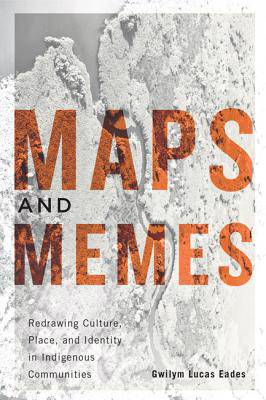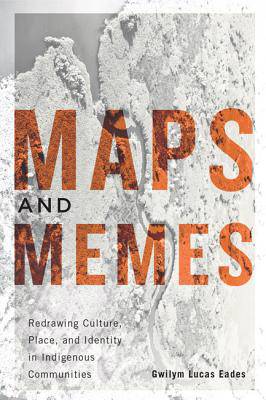
- Afhalen na 1 uur in een winkel met voorraad
- Gratis thuislevering in België vanaf € 30
- Ruim aanbod met 7 miljoen producten
- Afhalen na 1 uur in een winkel met voorraad
- Gratis thuislevering in België vanaf € 30
- Ruim aanbod met 7 miljoen producten
Zoeken
Maps and Memes
Redrawing Culture, Place, and Identity in Indigenous Communities Volume 76
Gwilym Lucas Eades
€ 53,45
+ 106 punten
Omschrijving
Maps and cartography have long been used in the lands and resources offices of Canada's indigenous communities in support of land claims and traditional-use studies. Exploring alternative conceptualizations of maps and mapmaking, Maps and Memes theorizes the potentially creative and therapeutic uses of maps for indigenous healing from the legacies of residential schools and colonial dispossession. Gwilym Eades proposes that maps are vehicles for what he calls "place-memes" - units of cultural knowledge that are transmitted through time and across space. Focusing on Cree, Inuit, and northwest coast communities, the book explores intergenerational aspects of mapping, landscape art practice, and identity. Through decades of living in and working with indigenous communities, Eades has constructed an ethnographically rich account of mapping and spatial practices across Canada. His extended participation in northern life also informs this theoretically grounded account of journeying on the land for commemoration and community healing. Interweaving narrative accounts of journeys with academic applications for mapping the phenomena of indigenous suicide and suicide clusters, Maps and Memes lays the groundwork for understanding current struggles of indigenous youth to strengthen their identities and foster greater awareness of traditional territory and place.
Specificaties
Betrokkenen
- Auteur(s):
- Uitgeverij:
Inhoud
- Aantal bladzijden:
- 264
- Taal:
- Engels
- Reeks:
Eigenschappen
- Productcode (EAN):
- 9780773544482
- Verschijningsdatum:
- 1/01/2015
- Uitvoering:
- Hardcover
- Formaat:
- Genaaid
- Afmetingen:
- 157 mm x 231 mm
- Gewicht:
- 498 g

Alleen bij Standaard Boekhandel
+ 106 punten op je klantenkaart van Standaard Boekhandel
Beoordelingen
We publiceren alleen reviews die voldoen aan de voorwaarden voor reviews. Bekijk onze voorwaarden voor reviews.











